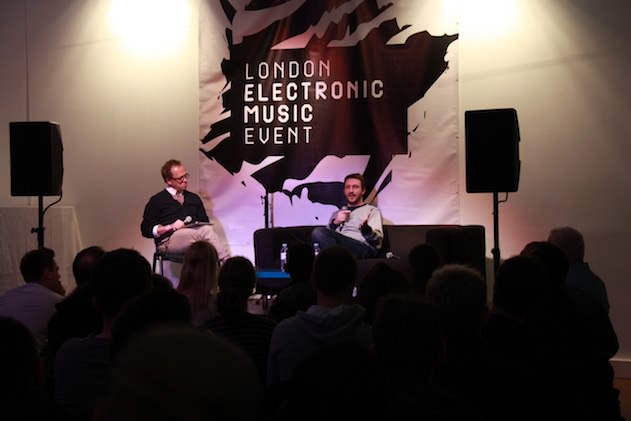Speaking at this year’s London Electronic Music Event, Director of Toolroom Records Stuart Knight explains what’s really involved in setting up and running a successful dance music label.
In less than a decade, brothers Stuart and Mark Knight have built one of the most successful and recognisable brands in contemporary electronic music, expanding from selling records into live events, music publishing and lifestyle merchandising, as well as future plans for a Toolroom TV channel.
In this exclusive interview Stuart discusses Toolroom’s humble beginnings, offers advice for young entrepreneurs looking to follow in his footsteps and why he believes approachability is the most important characteristic for success in the music business.
Can you give us an introduction about yourself and where the label is right now?
Toolroom as a record label and as a business has been going for about nine years now. My brother, Mark, was always making and producing music and the label came from looking at the kind of deals he was being offered from other labels, then thinking, ‘We can do this. We can do it just as well, if not better, and we can take a bigger cut from it.’
It started from very humble beginnings. The name Toolroom comes from my parents’ tool shed, which is where we built our studio. The first office was my parents’ study, which was three sweaty guys working back-to-back from eight in the morning until eight at night for no money – at least for the first year – but it was a passion, it was something we really wanted to do.
The label itself has taken a long time to grow and we’re always looking at investing in people, getting people involved in the label. We’re now 19 people strong and it’s been a long hard slog but it’s been really enjoyable.
You have to base everything around the music, define your sound and have a clear message that you’re trying to get across. That message is the music, whatever style it is. It can branch off later on, but when you’re starting it has to be a very, very clear message.
We’ve developed over eight years based on hustling hard and being approachable. When we were trying to approach other labels there was this kind of standoffishness. Unless you were of a particular standing you didn’t get the person answering the phone or didn’t get the reply to the email. We wanted to be approachable, from the kid in his bedroom giving us a demo to signing records now from people like Coldplay. We wanted to be accessible.
Do you think that gets harder as time goes on?
Yeah, I’m doing less and less music and more and more running a business. We have a saying at Toolroom: ‘We could be selling washing machines.” We’re not, we’re selling music, so it’s very easy to get up in the morning and do something you’re passionate about, but we still have the same work ethic and business model as if we were selling washing machines. You’ve got to have that in place. If you don’t, it’s a hobby. If you want to give up your day job and make a career from it that work ethic has to be there from the word go.
I’m always in the office. I love picking up the phone. So does Mark when he’s in the office. We’re not going to find the next young talent by being standoffish or unapproachable. I’ve got a lot of time and respect for the young kid who comes up and pushes the CD in my hand. The wrong way to do it is a blank email to me and 16 other labels going, ‘Check this out…’ I haven’t got time to do that, I’m checking out a hundred other things. The personal touch is still key.
What’s also important is doing that bit of homework about me, about the label, about our sound, about where you think we’re going. If you can give us a little bit of that at the same as you hand us the demo it counts for so much. It means that you understand where we’re coming from, it means that have an understanding of where your record sits on the label and it gives us that affirmation that you’re really serious about being part of our label.
How do you cross over from underground to the mainstream? Is it possible to achieve long-term success in both arenas?
We sit down at the beginning of every year and write a budget and at some point it always comes up, ‘How do we put a hit record in that budget?’ There’s no magic formula to writing a hit in dance music. You can go down that road of thinking, ‘I’m going to be David Guetta. I’m going to write a pop song.’ I don’t think that’s the way to tackle it. I think you should get comfortable with what you produce and comfortable with what you like. If that has crossover potential you’ll see it very early on. Trying to write a crossover record never works. I’ve been trying to do it with my brother for 15 years and it never works!
We did a track for the Black Eyed Peas and it was never meant to be a Black Eyed Peas track. It started out as an underground house record and it developed into something else. That’s where the whole business side of it comes in. If you do develop an idea like that and you’re not too comfortable – it may be a bit too poppy, a bit too crossover for the label – you’ve got an avenue to give it to someone else. In that particular case we gave it to David Guetta who gave it to will.i.am and then it appeared on the Black Eyed Peas album. There’s ways of achieving crossover success but also staying true to what you want to be as long as you have that network of people.
How do you stay at the forefront of a particular scene and sound?
Immerse yourself in the scene. You can’t dip into it, you have to live and breathe it. It’s a 24 hour job. If you love it that’ll come across in what you do. Trying to stay current for us has also involved employing younger and younger people, I’ve got to be honest.
We started the record label when vinyl and physical sales were in decline and everyone said we must be mad. We saw that there’d be a new way people would want to buy music and we thought, ‘If we can make it in a time when it’s tough, when it does start to pick up a bit we should be fairly high on the crest of that wave.’

